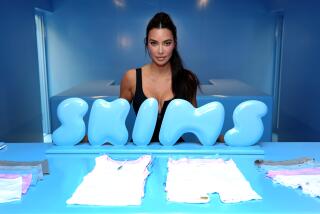Not your grandparents’ scrubs: Trendy medical-wear retailer Figs goes public
- Share via
Benj Lance never thought he could look particularly good in his work uniform: the plain, boxy scrubs that populate hospitals and doctor’s offices around the world.
Then the 33-year-old administrator at an Alabama pain management clinic saw a more distinct, fitted style on a colleague and never turned back: He now has more than half a dozen in his closet, all bought online from the same Santa Monica company.
“People don’t look good in scrubs. You look like you’re in pajamas,” said Lance, an avid runner who appreciated that the scrubs he saw “were joggers, not loose, not dragging the floor.” After he bought his first set a few years ago, he said, “everybody started asking me, ‘What are those?’”
Lance is the kind of customer 8-year-old online retailer Figs was counting on when it went public Thursday on the New York Stock Exchange, trading under its own name — after a remarkable pandemic-driven growth spurt in what long has been considered a stodgy industry: medical apparel.
The upstart that has made staid medical scrubs a hip commodity now ranks among the pandemic’s corporate winners: Net revenue more than doubled last year to $263 million as it turned a nearly $50-million profit, after barely breaking even in 2019. That’s due in part to a strategic social media presence that touts the company’s charitable values and celebrates its customers, a departure from the traditional model of scrubs sellers that rely on retail stores and hospital chains for distribution.
The company’s momentum was reflected in its IPO. Shares were priced Wednesday evening at $22 — $3 more than the expected maximum — and the opening trade still popped the stock nearly 29%. Shares closed at $30.02, up 36%, giving the company a roughly $4.8-billion market cap.
The offering of Class A shares also was upsized Wednesday by nearly 4 million to about 26.4 million, though Figs actually sold fewer shares and its largest investor, movie producer Thomas Tull, cashed in more. He garnered about $478 million of the roughly $580-million IPO.
At Thursday’s closing share price, co-founders and co-Chief Executives Trina Spear, a former Wall Street investment banker, and Heather Hasson, a fashion industry entrepreneur, have stakes worth more than $400 million each. Proceeds will be put toward the company’s further expansion, partly predicated on strong growth in the nation’s healthcare workforce.
“They introduced a brand nobody had ever heard of, but we live in an [apparel] industry that is disrupted every day. And it’s never been easier with the rise of social media and influencers,” said Brian Weitman, chief executive of STC-QST, an L.A. supplier of apparel components to clothing and scrubs makers. “It started from scratch saying, ‘Hey, you know, we’re not a uniform company. We’re a fashion company that designs great products that function for your work.’”
Customers such as Lance say they aren’t attracted by the fit and high-tech fabrics alone but also the company’s donation of scrubs to medical professionals in foreign countries and other corporate philanthropy, which has drawn comparisons to Warby Parker, an online eyeglasses retailer that helped popularize the “buy one, give one” concept.
Even in its IPO, Figs was striving to reflect the values it has long touted to customers. A limited number of shares were available at the pre-market price through Robinhood, the first time the popular trading platform has done such a deal — though it got only 1% of Class A shares, a fraction of what was acquired by institutional investors.
“I think the biggest gains are free publicity,” Matthew Kennedy, a senior IPO market strategist at Renaissance Capital, said of the Robinhood offering. “There are consumer brand benefits from reaching as many different people as possible. I will say 1% is a very small number of shares relative to the offering.”
Renaissance, an investment advisor, is offering Figs shares through an exchange-traded fund.
Figs faces competition from other online medical apparel retailers, including one nearby, the L.A.-area company Jaanuu, which is also venture capital-backed. But Figs’ two co-founders got a huge boost in 2017 when they landed a $65-million investment from Tull, the founder of Legendary Pictures, which released several “Batman” titles and the “Hangover” series.
Though Tull is cashing in millions of shares, he will still have the biggest stake in the company. And through a dual-share structure that gives Class B shares held by Tull, Spear and Hasson 20 votes per share, the trio will have a firm grip on the company.
Tull did not respond to requests for comment, and a Figs spokeswoman said Spear and Hasson could not talk prior to the IPO, citing Securities and Exchange Commission restrictions. The pair, however, have spoken publicly about the company’s founding narrative many times, an origin story that is core to Figs’ identity and is recounted in the prospectus.
Hasson, who had founded a necktie company, was having coffee in 2012 with a friend who had just come off a 16-hour shift as a nurse practitioner at City of Hope, a cancer center with offices throughout Southern California.
The friend was dressed in baggy scrubs, and thinking she could do better, Hasson decided to go shopping for her. It was a challenge steeper than she expected: Amid the bedpans and knee braces, Hasson found more dull scrubs, so she decided to have her friend’s outfit altered. She was soon doing it for other medical professionals as word got around about the snazzy uniforms.
A mutual friend later introduced Hasson to Spear, a Harvard Business School grad working at Blackstone Group in New York. Spear had worked on a scrubs industry deal at the private-equity firm and was familiar with the industry.
The pair started selling their fashionable scrubs outside hospitals when shifts changed, and they knew they were on to something before Spear even left Blackstone to devote all her time to the new business.
“People were actually buying the scrubs out of the trunk — no logo, no signage, no nothing,” Spear said in one videotaped interview. “And I was like, ‘Oh, my god. These are people with like master’s degrees. They’re just buying scrubs out of a car from two random girls on the street.’”
Spear eventually quit and moved to L.A. to start the company in 2013. She dumped her savings and her 401(k) into the startup and hit up former colleagues at Blackstone and Citigroup, where she had also worked.
The majority of Figs’ sales are for different versions of its stylishly cut, stretchy scrubs — with a basic top and bottom kit going for $86 but with others costing more. The company also sells outerwear, underwear and other accessories, always with an eye for fashion. One of its white doctor jackets wouldn’t look out of place at a hip West Los Angeles restaurant.
The company’s marketing proposition is as precisely targeted as its fashion-forward scrubs.
On its social media pages, where the clothing is modeled by medical professionals, Figs blasts its social mission and celebrates its mostly young clientele with an empowerment message. A recent post on Instagram, its largest social media channel, reads: “Human being. Doing. Helping. Learning. Supporting. Trying.” A legion of compensated social influencers, called ambassadors, back the company on its channels, including posting the ubiquitous #wearfigs hashtag.
“I wanted to become part of this kind of family, because it was something I’d never seen before,” said Katy Basnett, a 28-year-old pediatric neurosurgery nurse practitioner in the San Francisco Bay Area who is a company influencer. “On the social media side there is totally a community.”
Despite the apparent feel-good success, the company has faced blowback from its growth, which has come at the expense of some existing players. It’s fending off a lawsuit from one of the largest companies in the business, private-equity owned Careismatic Brands, which for years sold Dickie’s, Cherokee and other scrubs through traditional industry channels.
The Chatsworth company has accused Figs of unfair business practices, false advertising and other allegations related to the caliber of the upstart’s apparel and other issues. Figs has denied the allegations, and the case is expected to go to trial. In its prospectus, Figs cites the litigation as a risk factor that could adversely affect its business should it lose the case.
Figs is not the first maker of fashion scrubs. Another old-line scrubs maker, Barco Uniforms, is a family-owned Los Angeles company that has long sold a licensed line of “Grey’s Anatomy” scrubs. Barco also traditionally sold through retail outlets but is beefing up its direct-to-consumer online sales, taking a cue from the upstart competitor.
“I have to tip my hat to what Figs has done,” said Ron Wagenseil, Barco’s recently hired chief executive, who previously worked for Nike and other big brands. “The digital platforms — that’s what really was something that they were able to do. They did it right.”
More to Read
Inside the business of entertainment
The Wide Shot brings you news, analysis and insights on everything from streaming wars to production — and what it all means for the future.
You may occasionally receive promotional content from the Los Angeles Times.











